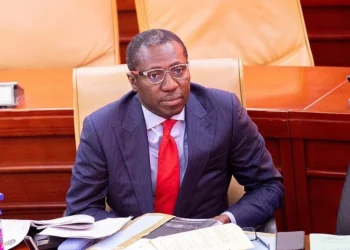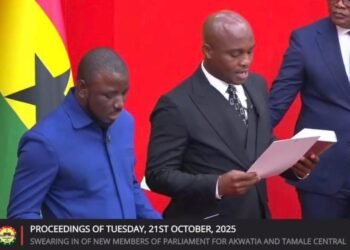Legal scholar and civic activist, Prof. Stephen Kwaku Asare, has reignited debate over the controversial Article 71 officeholder benefits, describing the retirement perks given to high-ranking officials as an extravagant reward scheme that undermines public service values.
His critique, aimed squarely at what he calls a “pyramid of privilege,” questions the legitimacy and morality of gratuities and pensions received by selected public officeholders, especially in a country grappling with basic developmental needs.
Prof. Asare drew attention to the compensation framework for Electoral Commission officials, arguing that although their retirement packages aren’t as lavish as others’, they still receive substantial rewards.
“Take the case of the Electoral Commission Chair or Deputy. Unlike our Lordships, they do not retire on their full salary. Instead, they retire on 50% of their salary if they serve at least four years, and 60% if they serve eight or more years, so long as they do not take another office of profit.”
Prof. Stephen Kwaku Asare

He noted that with a base salary of ₵62,000, even a 60% pension amounts to ₵37,200 per month. Over time, this becomes a major financial commitment by the state.
He added that after a 10-year term, the total gratuity payout stands at ₵2,480,000 — calculated as four months of salary for every year served.
He pointed out that the monthly pension received by these officials exceeds the regular salaries earned by many professionals, including doctors, nurses, auditors, teachers, pharmacists, and even university professors. “This is not retirement; it’s reward.”
Pyramid Of Privilege, Not Public Service
Broadening his critique, Prof. Stephen Asare highlighted that Members of Parliament and the Council of State are also beneficiaries of what he sees as excessive and unjustified rewards funded by taxpayers.
He emphasized that MPs receive a gratuity after each term served, accumulating significant payouts over multiple terms, while members of the Council of State similarly benefit from the system—characterizing it as a structure of privilege rather than genuine public service.

These benefits, Prof. Asare argued, exist in sharp contrast to the dire economic realities facing most Ghanaians.
“All of this in a country where basic services, including healthcare, education, roads, etc., struggle for funding. Where youth unemployment soars, and farmers, traders, and workers toil without social safety nets.”
Prof. Stephen Kwaku Asare
In his push for reform, Prof. Asare recommended that officials covered under Article 71 should be enrolled in the same pension scheme as regular workers, such as the Social Security and National Insurance Trust (SSNIT).
He argued that aligning their retirement benefits with standard rules—based on age, contribution years, and salary averages—would ensure fairness and long-term sustainability.
He was particularly critical of the current gratuity arrangement, arguing that it has no foundation in law.
According to him, the lavish payout structure has no grounding in Article 71 and is neither a legal requirement nor an unavoidable necessity. “It is political indulgence masquerading as tradition.”
Modest Article 71 Gratuity Advised
Additionally, Prof. Stephen Asare maintained that if gratuity payments are to be made, they should be modest and serve as symbolic gestures rather than large financial rewards.
He emphasized that the country’s limited resources cannot support such costly disbursements and urged the public to firmly oppose what he views as an unsustainable and unjustified practice.

“Let’s be clear: there is nothing in Article 71 that mandates these bloated gratuities or pensions. It does not specify four months’ salary per year worked. This is the handiwork of ‘Professor this, Professor that’ Emoluments Committees, who have engineered this quiet flood of elite compensation through conventions, not constitutional commands.”
Prof. Stephen Kwaku Asare
In his concluding comments, the legal expert called on the public to actively push for systemic change through sustained civic involvement and collective advocacy.
He stressed that meaningful reform will only happen if citizens consistently and forcefully reject the current system, which he believes has turned public service into an opportunity for excessive retirement benefits. “Not in a country struggling to keep the lights on.”
As public dissatisfaction with economic inequality grows, Prof. Asare’s bold critique may fuel a broader national conversation on fiscal responsibility, fairness, and the true meaning of public service.
READ ALSO: Davido’s ‘With You’ Sparks Sample Debate Among Afrobeats Fans























